今日推荐开源项目:《刷钱 awesome-indie》
今日推荐英文原文:《How Much Do Software Engineers Make?》

今日推荐开源项目:《刷钱 awesome-indie》传送门:GitHub链接
推荐理由:这个项目是能够帮助独立开发者挣钱的资源合集,其中大部分是情报和经验,比如新闻和经验者的演讲等等。作为独立开发者,不一定要追求利益,在这个过程中增长的技能经验以及眼界不管是在团队还是个人中都会起到重要的作用,而要积累经验最重要的就是动手而不是只停留于思考,毕竟世界上的任何问题都能用不管怎么说先试试看和还是放弃吧这两种方法去解决。
今日推荐英文原文:《How Much Do Software Engineers Make?》作者:Tony Yiu
原文链接:https://towardsdatascience.com/how-much-do-software-engineers-make-60565f50f579
推荐理由:软件工程师的工资趋势——不得不说他们真的很挣钱
How Much Do Software Engineers Make?
Writing Code is the Hottest Game in Town These Days — Let’s Find Out Whether the Salary Matches the Hype
In 2012 when I moved back to Silicon Valley, I remember hearing anecdotally that good software engineers were getting harder and harder to hire. And that Big Tech firms were fighting tooth and nail for the privilege to write huge checks to the best engineers.Back then I was just two years removed from getting my MBA from Rice University. I haven’t checked the stats lately but back then, as an MBA grad from a decently ranked program (of course if you went to Harvard or Stanford, you would expect more), you were pretty happy with a $100,000 to $110,000 base salary plus a modest bonus. So when I moved back to the Bay Area, I was shocked to hear that fresh graduates of top computer science undergrad programs were getting that much and more on top of generous grants of company stock or options.
In the years since, the compensation of software engineers has only risen driven by the massive profits earned by Big Tech (Facebook, Google, Apple, etc.), the massive influx of capital into startups from non-traditional venture firms like SoftBank, and the willingness of Wall Street (in most cases) to focus on the mission and the opportunity instead of the income statement.
Today, we will explore just how high Silicon Valley software engineer base salaries are and what the trend has been over the past few years using H1B salary data. I will borrow much of the methodology and code from my previous 2 compensation related posts, which you can find here:
How Much Do Data Scientists Make?https://towardsdatascience.com/how-much-do-data-scientists-make-cbd7ec2b458
How Much Do Data Scientists Make Part 2https://towardsdatascience.com/how-much-do-data-scientists-make-part-2-cb959a0d05f
Hope you enjoy! And if you would like to use my code for your own analyses, you can find it here on my GitHub.
How Much Do They Make?
Before we dive into the numbers, let’s get some details out of the way:- All data was scraped from the H1B Salary Database.
- I gathered data only for cities and towns in Silicon Valley (the San Francisco Bay Area).
- My data includes only the following 2 job titles — software engineer and senior software engineer.
- Finally, the numbers I present are base salaries only and do not include annual bonuses, RSUs (Restricted Stock Units), or stock options.
Here are the 2019 base salary quartiles for those in the H1B data with the software engineer title:
- 25th Percentile — $120,000
- 50th Percentile — $130,000
- 75th Percentile — $150,000
- 25th Percentile — $132,000
- 50th Percentile — $148,000
- 75th Percentile — $164,000
Which Companies Pay the Most?
Last time there was a fair amount of interest on which firms pay the highest salaries to data scientists, so let’s take a look at a similar chart for software engineers. To remind everyone what we’re looking at, the values on the following chart capture median H1B salaries by company for software and senior software engineers (I lump them all together) in Silicon Valley for the years 2018 and 2019. I only plotted the companies that hired at least 30 H1B software engineers during the period.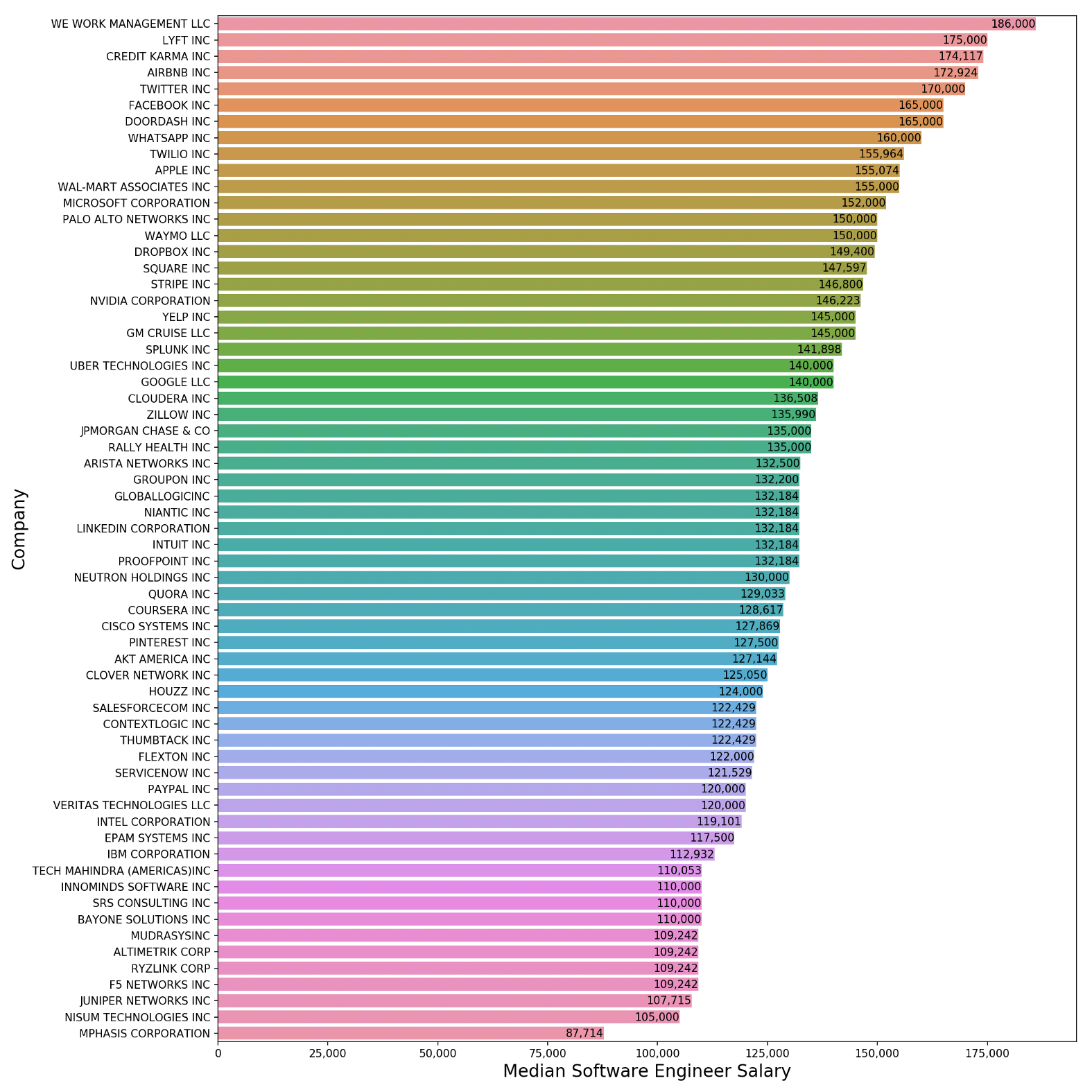
Median Software Engineer Salary by Company (2018–19)
A few things jump out to me:
- Of all the companies in my plot, only one pays a median salary below $100,000.
- There are 14 companies (all ones that you should recognize) on this list that pay a median base salary of $150,000 or more to their software engineers.
- Google as we will see later is one of the biggest hirers of H1B software engineers. They pay a handsome median base salary of $140,000, but that places them only number 23 on our list. Then again, they probably make up for it in other ways like bigger bonuses, lots of equity, larger than average raises, and all you can drink boba (the one perk that rules them all).
- Number 1 is … WeWork! I didn’t expect that. Then again, they have received a ton of funding from venture capitalists and are trying extremely hard to frame themselves as a tech company rather than a real estate company. Also, they are currently valued at $47 Billion. No matter how optimistic you are, it would be hard to expect much upside from the equity at these frothy levels (especially as it continues to burn massive amounts of cash) — so recent hires are probably demanding higher cash compensation to make up for the risk.
Who Hired the Most Over the Past Few Years?
Now let’s take a look at who hired the most H1B software engineers over the past 6 years (from 2014-19):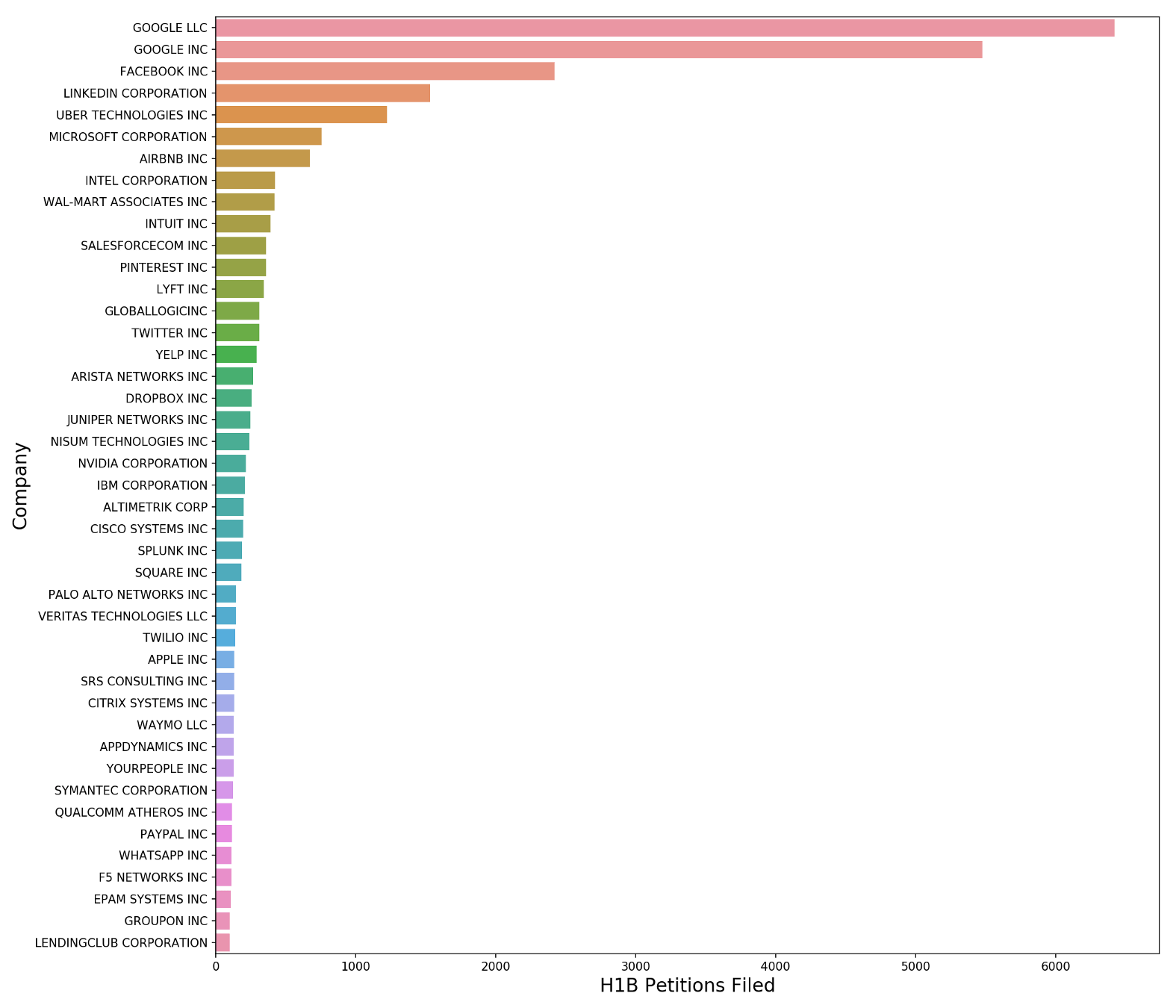
Who Hired the Most H1B Software Engineers (2014–19)
Wow look at Google — they hired orders of magnitudes more than everyone else. Facebook and LinkedIn are a distant second and third place — they still hired a few thousand software engineers over the time period I studied.
So it looks like Google dominates my dataset and software engineer hiring in general. That doesn’t necessarily skew my data though. Remember that all of these companies are competing against each other to hire quality engineers — nobody hires in a vacuum. So Google’s appetite for coders becomes the tide that lifts all boats (salaries) and its compensation package becomes the standard benchmark used in many a salary negotiation. Anecdotally this checks out, as I often hear engineers tell their fellows, “if you don’t think you are getting paid enough, go get a competing offer from Google.” Easier said than done of course.
Software Engineer Salary Trends Over the Past Few Years
Now let’s take a look at how the median salary of software engineers (both software engineers and senior software engineers) has trended over the past few years. From 2014 to 2019 (a 5 year a period), salaries increased by 14.8% which works out to an annualized growth rate of 2.8%. That’s not that much more than inflation (and a lot less than Silicon Valley inflation). As a benchmark for comparison, the median salary upon graduation for Stanford MBAs was $125,000 in 2014 and $142,000 in 2018 (that’s a 13.6% growth rate over 4 years, or a 3.2% annual growth rate).So while the level is high, the growth rate over the past few years was less than I thought it would be. Then again, this is just the growth in base salaries — much of the growth in compensation could have occurred on the equity side both in terms of getting more equity and an increase in the valuation of the shares already received.
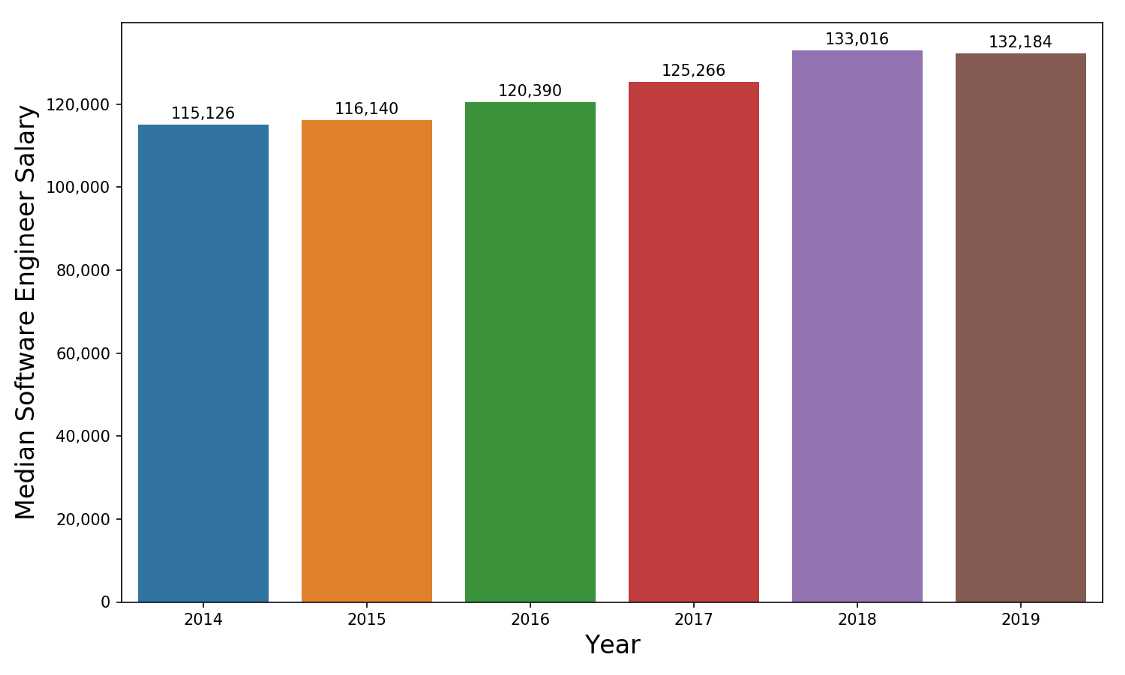
Software Engineer Median Salary by Year
In case you are curious about how the distribution of H1B software engineer salaries has trended, below is the box plot. Nothing too shocking here — the variance in salaries has remained relatively constant over time.
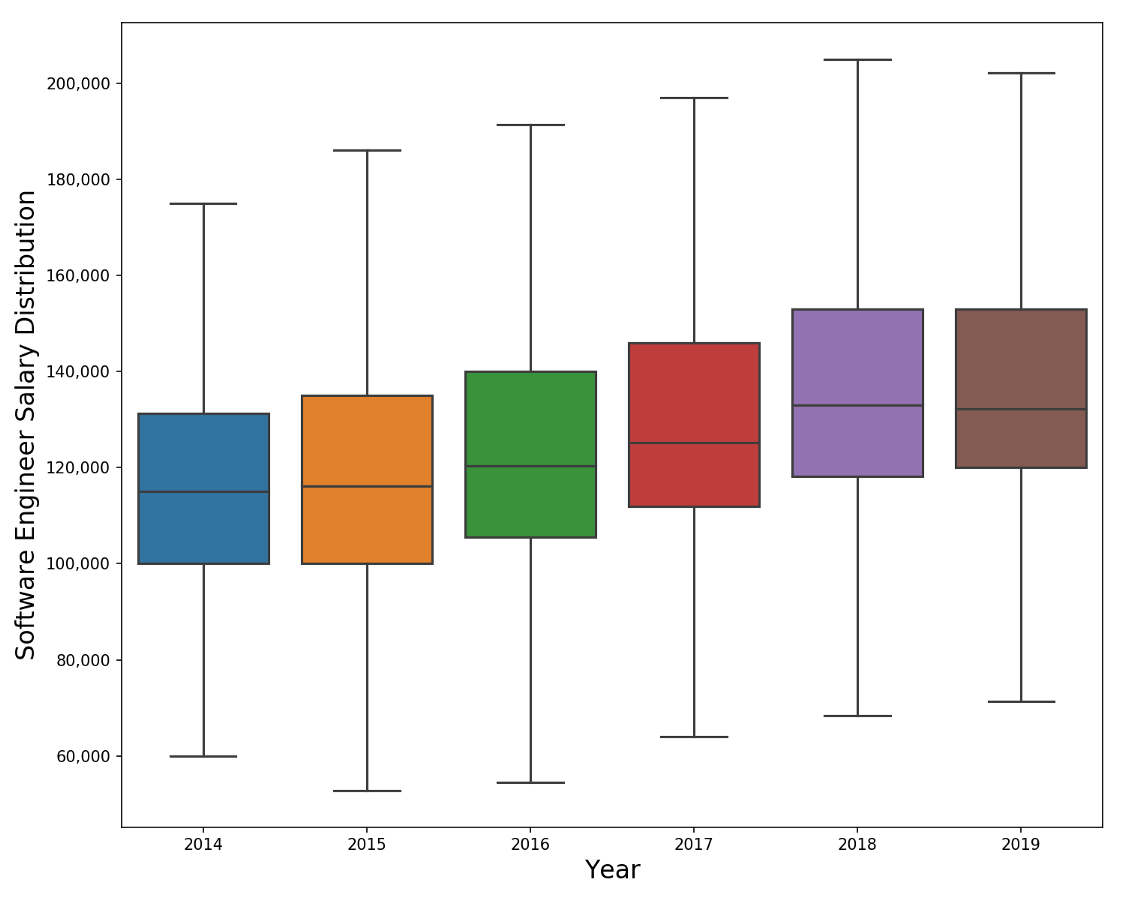
Distribution of Software Engineer Median Salary by Year
Other Trends in the Data
Since Big Tech, especially Google and Facebook, are so dominant in the data, let’s also examine the salaries of software engineers who don’t work for those companies. The following chart shows Big Tech median software engineer salaries in orange (is_tech=True) and everyone else in blue (is_tech=False). I define Big Tech as engineers working for the following firms — Google, Facebook, Microsoft, Uber, AirBnB, Lyft, Apple, Netflix, and LinkedIn.Big Tech firms definitely pay significantly more (probably a function of not only their higher profitability but also less perceived upside in their stock). However, the growth rate of the two groups is roughly equal (both around 14% for the 5 year period).
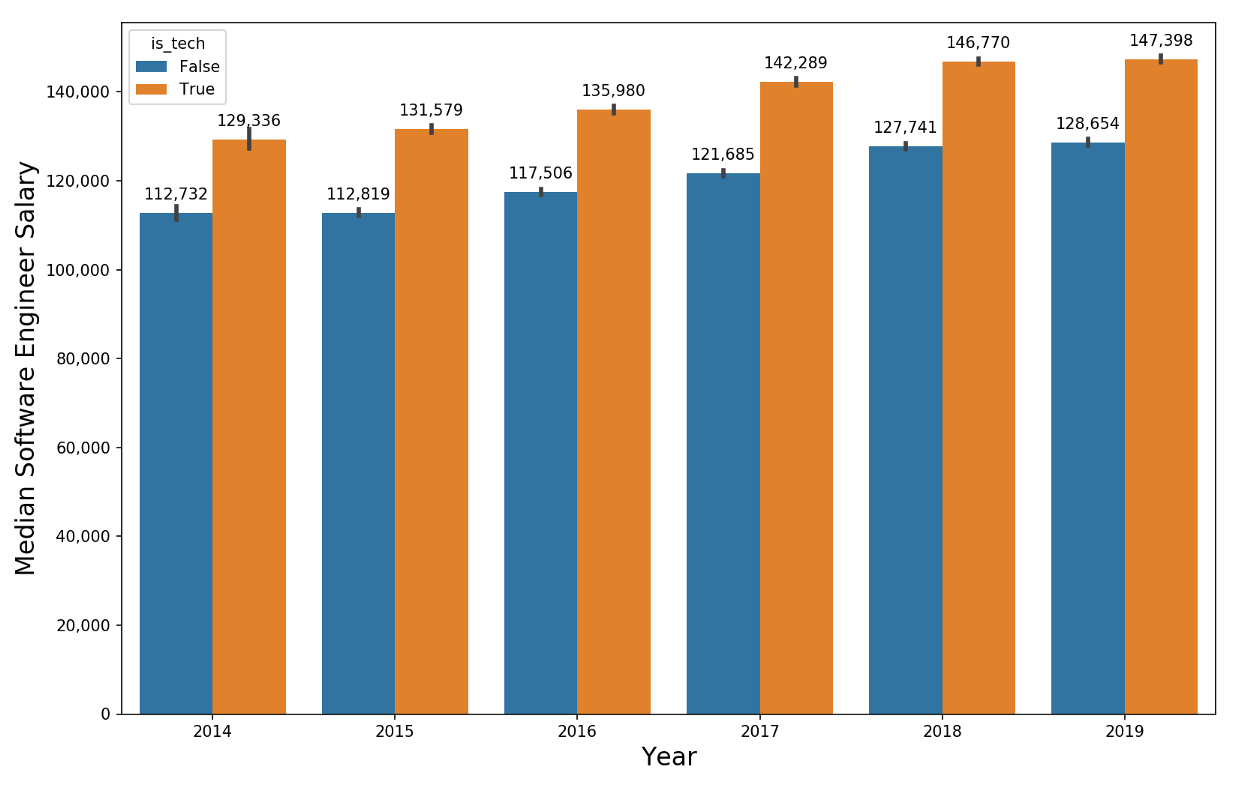
Median Software Engineer Salaries for Big Tech (in Orange) and Everyone Else (in Blue)
Finally, while I am not an expert on this, it seems like the software engineer title is used a lot more broadly at Big Tech firms — someone who would be considered a senior software engineer at a smaller, less well-known company would be a software engineer at Google or Facebook. This might explain some of the disparity between Big Tech software engineer salaries (which capture a wider range of experience levels) and everyone else.
There are some senior software engineer salaries in the Big Tech category so we can check my hypothesis by comparing software engineer and senior software engineer salaries across the “everyone else” (False on the X axis) and Big Tech (True on the X axis) categories:
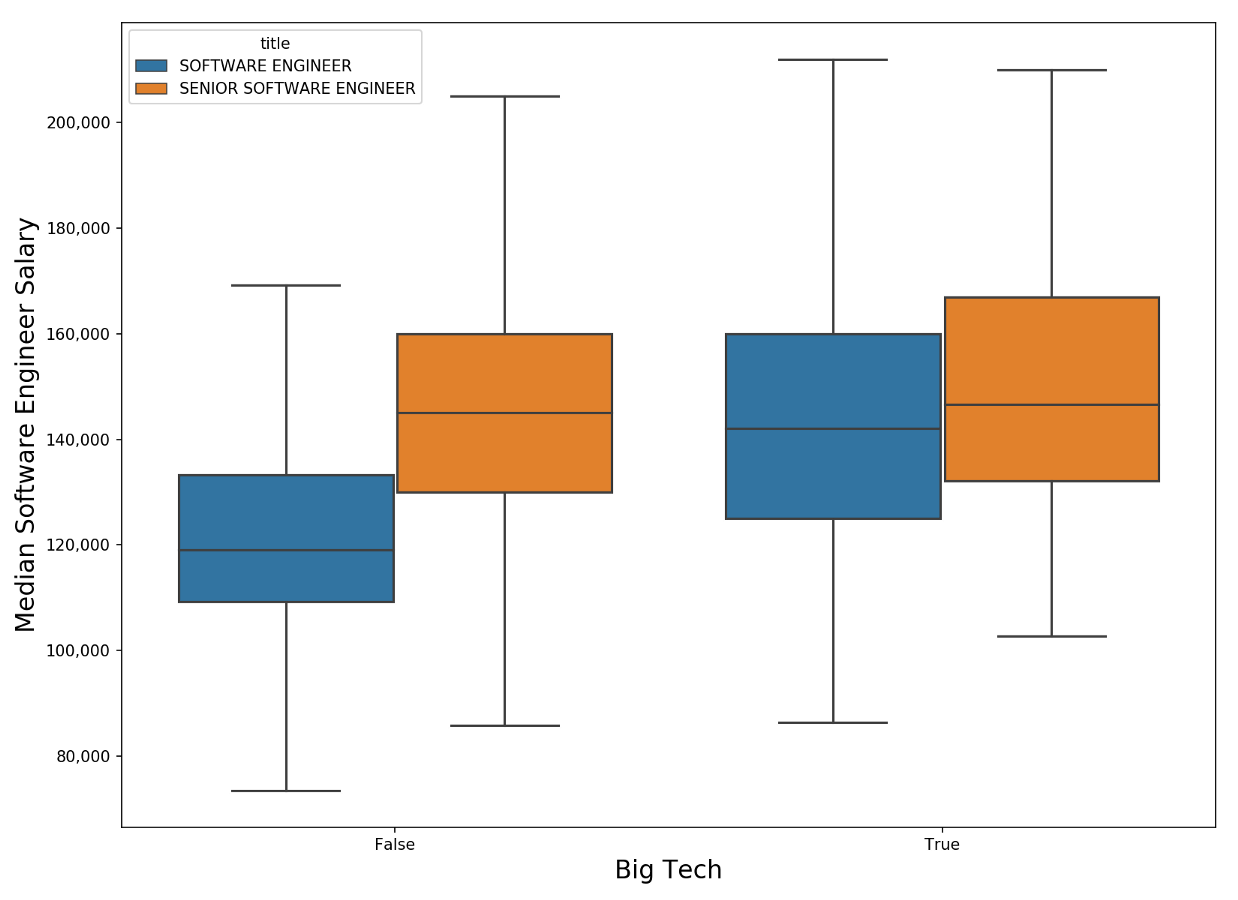
This seems to confirms my hypothesis — the distributions have much less overlap for the “everyone else” category (the blue and orange box plots on the left) than it does for Big Tech (the blue and orange box plots on the right). So it does seem like “software engineer” is more or less a catch-all title for a wide range of experience levels and ## salary bands at the Big Tech firms.
Conclusion
As software continues to “eat the world”, disrupting and transforming traditional industries, the skills of software engineers continue to be critical for any company that wants to compete on this playing field.The numbers back it up — while the growth rate is less than I thought, the level of the base salaries that coders are getting are very impressive (and don’t even tell the whole story of just how much money software engineers are making year in and year out).
Whether this is sustainable is a story for another time (yes for the Googles of the world, maybe not so much for the WeWorks and Ubers of the world). I hope this was helpful and insightful to you. Cheers!
下载开源日报APP:https://openingsource.org/2579/
加入我们:https://openingsource.org/about/join/
关注我们:https://openingsource.org/about/love/
